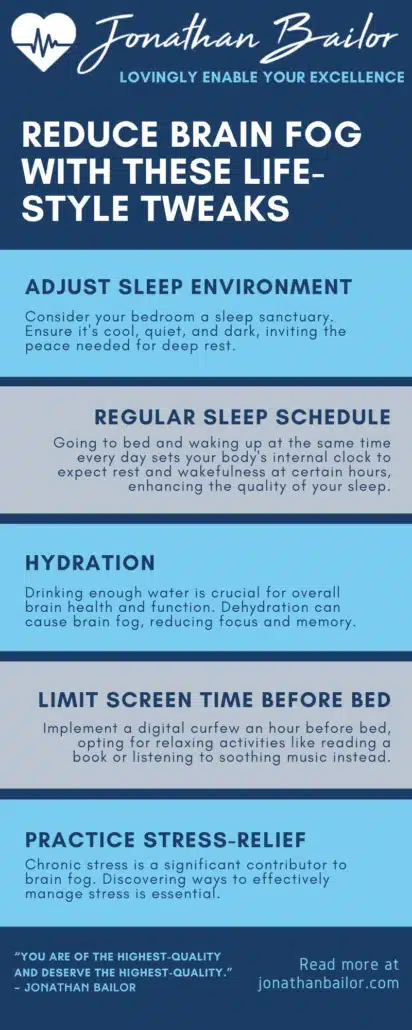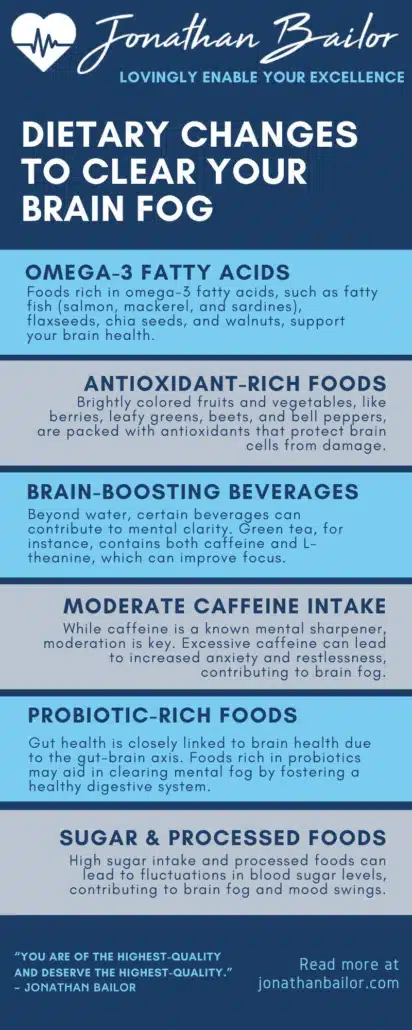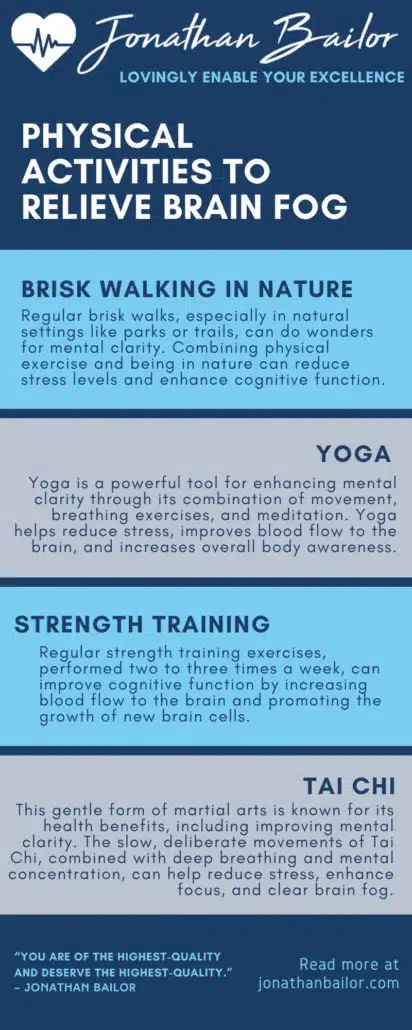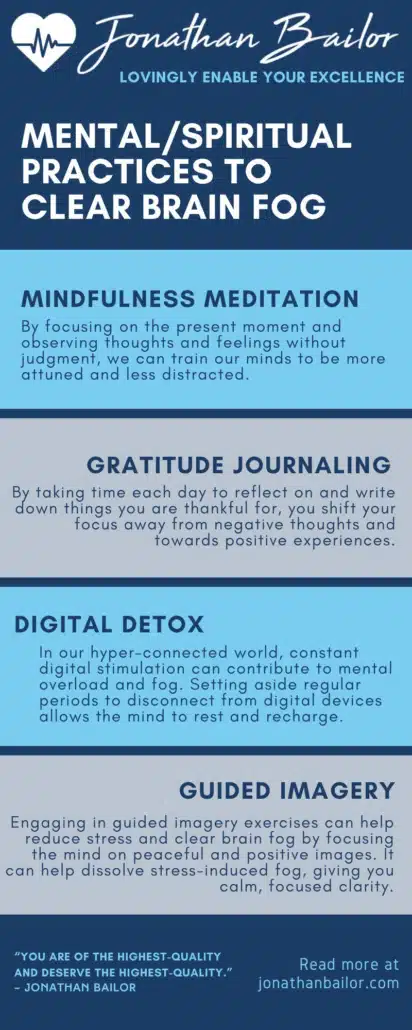Clearing the Fog: 19 Techniques to Reduce Brain Fog Naturally
Dive into this essential Brain Health Guide with Jonathan Bailor and unlock the secrets to clearing the mental mist that clouds your days. Discover transformative strategies and insights that promise not just to improve your memory but to enhance your overall cognitive function. Why let moments of forgetfulness or the vexing veil of brain fog hold you back from living your life to the fullest?
Ever find yourself walking into a room and forgetting why? Or staring at a grocery list and drawing a blank on what comes next? It’s like a cloud descends over your thoughts, making it hard to see clearly. This experience, often described as “brain fog,” isn’t just frustrating—it can significantly impact our daily lives and brain functions, from work to personal relationships.
But here’s some uplifting news: There are natural ways to disperse that fog, enhancing your mental clarity and focus without relying on medications or complex treatments. Imagine waking up to a mind as clear as the sky on a sunny day, ready to tackle your to-do list with precision and enthusiasm. It’s not just a dream—it’s entirely possible with some simple yet effective techniques.
Whether it’s tweaking your diet to include certain fog-clearing foods or excluding certain fog-inducing ones, engaging in specific types of physical activity that oxygenate your brain just the right way, or adopting mindfulness practices that train your brain to dismiss the haze and embrace clarity, there are myriad ways to reclaim your sharpness of mind.
And the beauty of these techniques? They’re accessible to everyone who may experience brain fog. You don’t need a degree to understand them or be of a certain age to reap their benefits. They’re grounded in the kind of wisdom that feels intuitive, almost as if by adopting them, you’re returning to a more natural state of being—a state where mental clarity is your natural right.
This blog post is an invitation to step into that clarity. It’s an assurance that no matter where you find yourself on life’s journey, there are steps you can take today to clear the fog and see your path ahead with renewed vision.
So, let’s embark on this journey of discovery together and remember to share this knowledge with friends and family; who knows, it might just be the beacon of light they’ve been searching for.
Lifting the Haze: Lifestyle Tweaks to Combat Brain Fog
Navigating through the mist of brain fog can be challenging, yet knowing that the journey to end cloudy thinking doesn’t solely rely on what we eat, how much we move, or our meditation practices is comforting. A broader spectrum of lifestyle adjustments can significantly impact our mental fog, acting as gentle breezes that help disperse the clouds obstructing our mental sunshine. These changes are simple to integrate into our daily lives, offering a holistic approach to enhancing mental clarity and improving cognitive performance.
Let’s explore a few lifestyle changes that can help lift the haze, ensuring a brighter, clearer tomorrow.
1. Optimize Your Sleep Environment
A restful night’s sleep is foundational for cognitive function. Sleep deprivation can give you that foggy feeling, trouble concentrating, cognitive difficulties, and more. Consider your bedroom a sleep sanctuary. Ensure it’s cool, quiet, and dark, inviting the peace needed for deep rest. Investing in a comfortable mattress and pillows can transform your sleep quality, directly influencing how clear-headed you feel the next day.
Remember, it’s not just the quantity of sleep that matters, but the quality, too.
2. Establish a Regular Sleep Schedule
Consistency is key when it comes to sleep. Going to bed and waking up at the same time every day sets your body’s internal clock to expect rest and wakefulness at certain hours, enhancing the quality of your sleep. This regularity can significantly diminish brain fog, positively affect cognitive function, and relieve memory problems, as a well-rested brain is more alert and focused.
Viewing sleep as a non-negotiable part of your day can change the game for your mental clarity.
3. Hydration
Drinking enough water is crucial for overall brain health and function. Dehydration can cause brain fog, reducing focus and memory. It can result in poor concentration.
Aim to drink at least eight glasses of water a day, more if you’re active or live in a hot climate. Think of water as the elixir of clarity; staying hydrated directly supports your brain’s ability to function optimally.
4. Limit Screen Time Before Bed
The blue light from screens can disrupt sleep quality and duration. Implement a digital curfew an hour before bed, opting for relaxing activities like reading a book or listening to soothing music instead.
This habit can aid in achieving deeper sleep states, which refresh and clear the mind, preparing it for the next day’s challenges.
5. Create a Stress-Relief Routine
Chronic stress is a significant contributor to brain fog. Discovering ways to effectively manage stress is essential. This might mean adopting a hobby, spending time in nature, or engaging in relaxation techniques such as deep breathing exercises or yoga.
A mind unburdened by stress is more capable of sharp, clear thought, and dedicating time to stress relief can profoundly affect your mental clarity.
Each lifestyle change offers a step towards a clearer, more focused mind. By integrating these practices into your daily routine, you’re not just clearing the fog; you’re illuminating a path to a brighter, more vibrant cognitive landscape.
Sharing these steps can help others find their way through the haze, fostering a community where mental clarity is within everyone’s reach.

Feeling Better Is Priceless, That's Why We Don't Put A Price On It!
“It’s Like A Free and Medically Valid Version of Noom and Weight Watchers Online”
~ Dr. Doctor Matthew Oleshiak, MD
Click the 'LEARN MORE' button below for free lifetime access to the fast fix program developed by Jonathan and top Ivy League Medical Doctors
LEARN MOREP.S. It's not a free trial. It's not part of the program for free. The entire program is free, forever, for real! No credit card needed.
Nourishing the Mind: Diet Changes to Clear Brain Fog
Embarking on a journey to clear brain fog doesn’t just involve adjusting how we live but also closely examining what we nourish our bodies with. The foods we choose to consume play a pivotal role in either dispersing or contributing to the mental haze we experience, including the brain fog from conditions like chronic fatigue syndrome. Just as a garden thrives on the proper nutrients, our brains flourish when fed a healthy diet with foods that support mental clarity.
Here are some dietary adjustments to consider, focusing on enhancing cognitive function and lifting the fog that can sometimes cloud our thoughts. Each suggestion is rooted in the principle that what feeds the body also feeds the mind, paving the way for a clearer, more vibrant mental landscape.
1. Increase Omega-3 Fatty Acids
Foods rich in omega-3 fatty acids, such as fatty fish (salmon, mackerel, and sardines), flaxseeds, chia seeds, and walnuts, support brain health. These essential fats are vital for maintaining the integrity of brain cells and facilitating communication between them.
Incorporating omega-3-rich foods into your diet can help enhance memory, mood, and mental clarity, acting as a natural antidote to brain fog.
2. Incorporate Antioxidant-Rich Foods
Antioxidants combat oxidative stress, a culprit in brain fog. Brightly colored fruits and vegetables, such as berries, leafy greens, beets, and bell peppers, are packed with antioxidants that protect brain cells from damage.
Regularly including these colorful foods in your meals can support brain health and clear the path for sharper cognition.
3. Stay Hydrated with Brain-Boosting Beverages
Beyond water, certain beverages can contribute to mental clarity. Green tea, for instance, contains both caffeine and L-theanine, which together can improve focus and reduce anxiety. Herbal teas like peppermint or rosemary are also beneficial, offering antioxidant properties without caffeine.
Hydrating with these brain-boosting beverages can gently lift your mental state.
4. Moderate Caffeine Intake
While caffeine is a known mental sharpener, moderation is key. Excessive caffeine can lead to increased anxiety and restlessness, contributing to brain fog.
Enjoying a morning cup of coffee or tea can awaken your senses and sharpen your focus, but keeping your caffeine intake in check ensures that this stimulant works for you, not against you.
5. Include Probiotic-Rich Foods
Gut health is closely linked to brain health due to the gut-brain axis. Foods rich in probiotics, such as yogurt (without added sugars), kefir, sauerkraut, and kombucha, support a healthy gut microbiome, which in turn can influence mood and cognitive function.
Regular consumption of probiotic-rich foods may aid in clearing mental fog by fostering a healthy digestive system.
6. Minimize Sugar and Processed Foods
High sugar intake and processed foods can lead to fluctuations in blood sugar levels, contributing to brain fog and mood swings. Focusing on whole, unprocessed foods and moderating sugar consumption can stabilize energy levels and support overall brain function.
Consider natural sweeteners like stevia or monk fruit as alternatives when a touch of sweetness is desired.
By making these dietary changes, you’re not just feeding your body; you’re also nourishing your brain, setting the stage for clearer thinking and improved mental agility.
As you adjust your diet to embrace these brain-boosting foods, you may find the fog lifting, revealing a sharper, more focused you ready to face the challenges and joys each day brings.

Energizing the Mind: Physical Activities to Combat Brain Fog
While nourishing the mind and body through diet and lifestyle adjustments forms the foundation for combating brain fog, incorporating specific physical activities into our routine can significantly enhance our mental clarity. These activities are not just about moving the body but also about engaging the mind in ways that foster focus, reduce stress, and stimulate cognitive function. The beauty of these physical activities is their simplicity and accessibility, making them easy to weave into the fabric of our daily lives.
Let’s explore some physical activities that can help lift the veil of brain fog, illuminating a path to improved mental acuity and overall well-being.
1. Brisk Walking in Nature
Regular brisk walks, especially in natural settings like parks or trails, can do wonders for mental clarity. Combining physical exercise and being in nature can reduce stress levels, improve mood, and enhance cognitive function.
Aim for a daily walk, allowing the rhythmic steps and fresh air to clear your mind and invigorate your senses.
2. Yoga
Yoga is a powerful tool for enhancing mental clarity through its combination of movement, breathing exercises, and meditation. Yoga helps reduce stress, improves blood flow to the brain, and increases overall body awareness.
Engaging in yoga sessions a few times a week can help sharpen focus, improve memory, and dissipate the fog clouding the mind.
3. Strength Training
Regular strength training exercises, performed two to three times a week, can improve cognitive function by increasing blood flow to the brain and promoting the growth of new brain cells.
Focus on compound movements that engage multiple muscle groups, such as squats, lunges, and push-ups. These exercises not only build physical strength but also challenge the brain, keeping it sharp and clear.
4. Tai Chi
This gentle form of martial arts is known for its health benefits, including improving mental clarity. The slow, deliberate movements of Tai Chi, combined with deep breathing and mental concentration, can help reduce stress, enhance focus, and clear brain fog.
Practicing Tai Chi regularly can provide a peaceful yet powerful way to rejuvenate the mind and body.
Integrating these physical activities into your daily or weekly routine can create a powerful synergy that helps lift brain fog and enhance mental clarity. Each activity offers a unique blend of benefits that contribute to a sharper, more focused mind capable of easily navigating the complexities of daily life.
By moving your body, you’re not just enhancing your physical health but also clearing the path for a brighter, clearer mental landscape.

Illuminating the Path: Mental and Spiritual Practices to Clear Brain Fog
In our quest to clear the mist of brain fog, we’ve explored the impact of diet, lifestyle, and physical activity. Yet, there’s another dimension equally crucial in our journey toward mental clarity: our mental and spiritual well-being.
These practices delve into the depths of our consciousness, addressing the fog from within by fostering inner peace, enhancing focus, and nurturing a positive mindset. Integrating mental and spiritual practices into our daily routines offers a holistic approach to dissipating brain fog, illuminating a path to a clearer, more vibrant mental state.
Let’s explore four transformative mental and spiritual changes that can significantly enhance our cognitive clarity.
1. Mindfulness Meditation
Mindfulness meditation is a powerful tool for enhancing mental clarity. By focusing on the present moment and observing thoughts and feelings without judgment, we can train our minds to be more attuned and less distracted. Regular practice can reduce stress, improve attention, and clear the mental clutter contributing to brain fog.
Allocating just a few minutes each day to mindfulness meditation can open the door to a more focused and clear-minded state of being.
2. Gratitude Journaling
Cultivating a practice of gratitude can profoundly affect mental clarity and overall well-being. By taking time each day to reflect on and write down things you are thankful for, you shift your focus away from negative thoughts and towards positive experiences.
This practice can enhance mood, reduce stress, and foster a sense of peace and contentment, paving the way for clearer cognitive function.
3. Digital Detox
In our hyper-connected world, constant digital stimulation can contribute to mental overload and fog. Setting aside regular periods to disconnect from digital devices allows the mind to rest and recharge.
Whether it’s a few hours each day or a designated day of the week, a digital detox can reduce stress, enhance creativity, and improve mental clarity, offering a much-needed respite for the brain.
4. Guided Imagery
Engaging in guided imagery exercises can help reduce stress and clear brain fog by focusing the mind on peaceful and positive images. This practice involves visualizing a tranquil setting or scenario in great detail, using it as a mental escape to foster relaxation and mental clarity.
Incorporating guided imagery into your relaxation routine can help dissolve stress-induced fog, giving you a sense of calm and focused clarity.
By embracing these mental and spiritual practices, you’re not just clearing away the fog but lighting a path to a more mindful, serene, and clear state of being. Each practice offers a unique way to nurture the mind and spirit, contributing to a holistic approach to overcoming brain fog and enhancing mental clarity.
As you incorporate these practices into your life, you may find that the path through the fog becomes more illuminated, guiding you toward a state of mental vibrancy and clarity.

FAQs on Enhancing Brain Health Naturally
Many questions arise in our journey toward achieving a clearer mind and enhancing our brain health. Navigating these queries with insightful, evidence-based responses is essential to empower us to make informed decisions about our mental well-being.
Here are answers to some frequently asked questions about natural ways to support and improve brain health.
1. Can sleep really affect my brain health?
Absolutely. Sleep is not just a period of rest for the body but also a critical time for the brain to consolidate memories, process information, and repair itself. A consistent lack of quality sleep can lead to decreased cognitive function, impaired memory, and a higher risk of developing neurological disorders.
Ensuring a regular sleep schedule and creating a restful environment can significantly improve brain health and cognitive clarity.
2. How does physical exercise benefit my brain?
Physical exercise is like a tonic for the brain. It increases blood flow to the brain, which brings oxygen and nutrients vital for its function. Regular exercise also stimulates the production of neurotrophic factors, which support the growth and survival of neurons, enhancing brain plasticity. This can improve cognitive functions such as problem-solving, memory, and attention.
Moreover, exercise reduces stress levels, indirectly benefiting brain health by lowering the risk of stress-related cognitive decline.
3. Are there specific foods known to improve brain health?
Yes, certain foods have been identified as beneficial for brain health. Foods rich in omega-3 fatty acids, such as fatty fish, flaxseeds, and walnuts, support brain cell structure and function. Antioxidant-rich foods, like berries, leafy greens, and nuts, protect the brain from oxidative stress.
Foods high in vitamins E and C and those containing flavonoids also contribute to brain health by reducing inflammation and supporting overall brain function.
4. Can mental exercises or games improve my brain health?
Engaging in mental exercises or brain games can stimulate cognitive functions and enhance mental agility. Activities such as puzzles, crosswords, chess, and memory games challenge the brain, keeping it active and engaged. These activities can improve aspects of cognitive function, such as memory, attention, and problem-solving skills.
However, combining these mental exercises with physical activity, proper nutrition, and adequate sleep for overall brain health is important.
5. Does stress have a long-term impact on brain health?
Chronic stress can indeed have a detrimental effect on brain health. Prolonged exposure to stress hormones like cortisol can damage brain cells and inhibit the growth of new neurons, particularly in areas of the brain associated with memory and emotional regulation.
Finding effective stress management techniques, such as mindfulness meditation, yoga, or deep-breathing exercises, can help mitigate these effects and protect your brain health over the long term.
Addressing these questions is a step toward understanding how our daily choices and habits can significantly impact our brain health. By incorporating informed practices into our lifestyle, we can nurture our brains, ensuring better mental clarity and cognitive function as we age.
A Clearer Tomorrow: Embracing Brain Health Together
As we conclude our exploration of the natural avenues for enhancing brain health, remember that the journey to mental clarity doesn’t have to be walked alone. We can all step into a brighter, more focused future together by sharing these insights with friends and family.
Whether it’s through diet, physical activity, mental exercises, or fostering our spiritual well-being, each step taken is a stride toward a life marked by enhanced cognition and overall well-being.
Let’s spread the word on social media and email, inviting those we care about to join us in this transformative journey to a clearer tomorrow.
Feeling Better Is Priceless, That's Why We Don't Put A Price On It!
“It’s Like A Free and Medically Valid Version of Noom and Weight Watchers Online”
~ Dr. Doctor Matthew Oleshiak, MD
Click the 'LEARN MORE' button below for free lifetime access to the fast fix program developed by Jonathan and top Ivy League Medical Doctors
LEARN MOREP.S. It's not a free trial. It's not part of the program for free. The entire program is free, forever, for real! No credit card needed.




